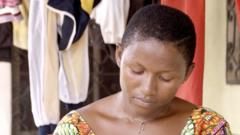In a heart-wrenching scene in Limbe, a coastal city in Cameroon's South-West region, Ngabi Dora Tue stands amidst grieving relatives, her husband's coffin at the center of a painful gathering. Johnson Mabia, an English-speaking civil servant, was among a group abducted by armed separatists four years ago, demanding a staggering ransom for their release. The situation, already tragic, escalated when Dora found out that Johnson was brutally murdered, his body discarded on the roadside.
This violence is embedded in a long-standing conflict rooted in historical grievances dating back to Cameroon’s full independence in 1961. The formation of a unitary state in 1972 led to increased frustrations among the English-speaking minority who contend with a predominantly francophone government. The last decade has seen a surge in conflict as peaceful protests against perceived injustices morphed into armed rebellion. By 2017, separatist leaders proclaimed the creation of the Federal Republic of Ambazonia, a move that heightened tensions further.
The humanitarian costs have been staggering. Analysis suggests that at least 6,000 lives have been lost and approximately five million individuals affected. The testimonies of survivors illustrate a harrowing reality. Journalist Blaise Eyong recounts waking up daily to scenes of violence, body parts scattered, and the fear of being kidnapped a grim certainty. In response to this insecurity, Cameroon's government has enacted drastic measures, spurning efforts for dialogue that began in earnest in 2019 but failed to produce substantive change.
While separatist forces claim to represent a legitimate fight for self-determination, allegations of human rights abuses have surfaced on both sides. Groups like Human Rights Watch have documented extensive state-sponsored violence, including torture and arbitrary killings, illustrating the depravity of the ongoing conflict.
Survivor narratives reveal an unending cycle of violence and fear. John, an anonymous victim, describes his harrowing experience of torture while detained by government forces on suspicion of supporting separatists. Alternatively, Joe, another victim, recounted the chilling moment he was abducted by separatists who sought to instill fear through execution—a common occurrence as many families experience agonizing loss.
Educating the youth in these conflict-ridden areas has become a daunting challenge. Nearly half of the schools in the South-West region have closed largely due to the violence instigated by both separatists and repressive government actions against perceived threats. Journalist Eyong highlights the legacy of this lost education—a generation of children being deprived of their future amidst the violent chaos.
Despite ongoing international attempts to de-escalate tensions, stability remains elusive, with multiple armed groups now contributing to the conflict in various ways fostering even more instability for civilians like Ngabi Dora, who finds herself overwhelmed by grief and financial strain in the aftermath of her husband's death. The future is uncertain, with many parents contemplating desperate measures for survival as families seek solace amid profound loss. The Ambazonia Defense Forces insist they operate within international law, distancing themselves from the violence perpetrated by rogue factions amid a war that continues to bleed an already fractured community.
In a reflection of the dire situation, the local populace grapples with existential concerns: how to reclaim a sense of normalcy in a region where safety feels like a distant memory, and survival is increasingly a daily struggle riddled with uncertainty?
This violence is embedded in a long-standing conflict rooted in historical grievances dating back to Cameroon’s full independence in 1961. The formation of a unitary state in 1972 led to increased frustrations among the English-speaking minority who contend with a predominantly francophone government. The last decade has seen a surge in conflict as peaceful protests against perceived injustices morphed into armed rebellion. By 2017, separatist leaders proclaimed the creation of the Federal Republic of Ambazonia, a move that heightened tensions further.
The humanitarian costs have been staggering. Analysis suggests that at least 6,000 lives have been lost and approximately five million individuals affected. The testimonies of survivors illustrate a harrowing reality. Journalist Blaise Eyong recounts waking up daily to scenes of violence, body parts scattered, and the fear of being kidnapped a grim certainty. In response to this insecurity, Cameroon's government has enacted drastic measures, spurning efforts for dialogue that began in earnest in 2019 but failed to produce substantive change.
While separatist forces claim to represent a legitimate fight for self-determination, allegations of human rights abuses have surfaced on both sides. Groups like Human Rights Watch have documented extensive state-sponsored violence, including torture and arbitrary killings, illustrating the depravity of the ongoing conflict.
Survivor narratives reveal an unending cycle of violence and fear. John, an anonymous victim, describes his harrowing experience of torture while detained by government forces on suspicion of supporting separatists. Alternatively, Joe, another victim, recounted the chilling moment he was abducted by separatists who sought to instill fear through execution—a common occurrence as many families experience agonizing loss.
Educating the youth in these conflict-ridden areas has become a daunting challenge. Nearly half of the schools in the South-West region have closed largely due to the violence instigated by both separatists and repressive government actions against perceived threats. Journalist Eyong highlights the legacy of this lost education—a generation of children being deprived of their future amidst the violent chaos.
Despite ongoing international attempts to de-escalate tensions, stability remains elusive, with multiple armed groups now contributing to the conflict in various ways fostering even more instability for civilians like Ngabi Dora, who finds herself overwhelmed by grief and financial strain in the aftermath of her husband's death. The future is uncertain, with many parents contemplating desperate measures for survival as families seek solace amid profound loss. The Ambazonia Defense Forces insist they operate within international law, distancing themselves from the violence perpetrated by rogue factions amid a war that continues to bleed an already fractured community.
In a reflection of the dire situation, the local populace grapples with existential concerns: how to reclaim a sense of normalcy in a region where safety feels like a distant memory, and survival is increasingly a daily struggle riddled with uncertainty?



















